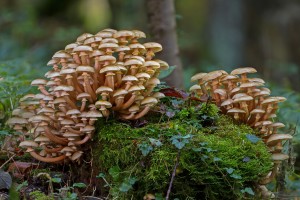 On March 1, BIOrescue partners celebrated their first milestone: their biorefinery project to recover used mushroom compost is now halfway to success. During the last 18 months, the full process has been successfully tested and the first product prototypes, including a potential new vaccine for plants, are expected to have promising applications in the agricultural sector.
On March 1, BIOrescue partners celebrated their first milestone: their biorefinery project to recover used mushroom compost is now halfway to success. During the last 18 months, the full process has been successfully tested and the first product prototypes, including a potential new vaccine for plants, are expected to have promising applications in the agricultural sector.
“Europe has a huge potential for biomass exploitation, especially in the area of agro-food residues”, says Inés del Campo, coordinator of the BIOrescue project and senior researcher at CENER, Spain’s National Renewable Energy Centre, “the technologies developed within BIOrescue will help unlocking this potential, while supporting the move towards a circular economy in the agro-industries, starting with mushroom industry. The results achieved already by BIOrescue partners are the best proof that public-private initiatives, such as the Bio-based Industries Joint Undertaking, co-funder of the project, are efficient, and strongly needed to bridge the gap between research and industry and take the European bioeconomy to the next level”.
In September 2016, experts from seven European countries, including one of the world’s largest mushroom producers, Monaghan Mushrooms, joined forces to test a new biorefinery process designed for mushroom compost, combined with other underutilised feedstocks, such as wheat straw.
Currently, compost used for mushroom growing is only effective for one to three harvests and has to be disposed of after use, creating significant financial and logistical problems for farmers. But even used mushroom compost still contains valuable components, and BIOrescue partners will transform it into competitive bio-based products, such as bio-pesticides, biodegradable nanocapsules for drug delivery, and bio-based horticultural fertilisers. In the first half of the project, partners tested several steps of the process, including thermo-chemical pretreatment and enzymatic hydrolysis, and developed new highly efficient enzymes for the recovery of sugars.
Additionally, the lignin extracted from the previous stages has been transformed into nanocarriers that can be loaded with biopesticides, with the aim of developing new drug delivery solutions for plants. The fully biodegradable nanocapsules ensure the progressive and controlled release of the biopesticide within, which will be developed at a later stage in the project.
In the coming year, the next challenge for BIOrescue partners will be the optimisation of the biorefinery concept and the final development of the low carbon products that will be created through this new process. Once fully developed, the mushroom compost biorefinery will significantly reduce disposal costs for mushroom farmers while delivering new high-value products for agricultural applications.
For more information, www.biorescue.eu
Text by BIOrescue


